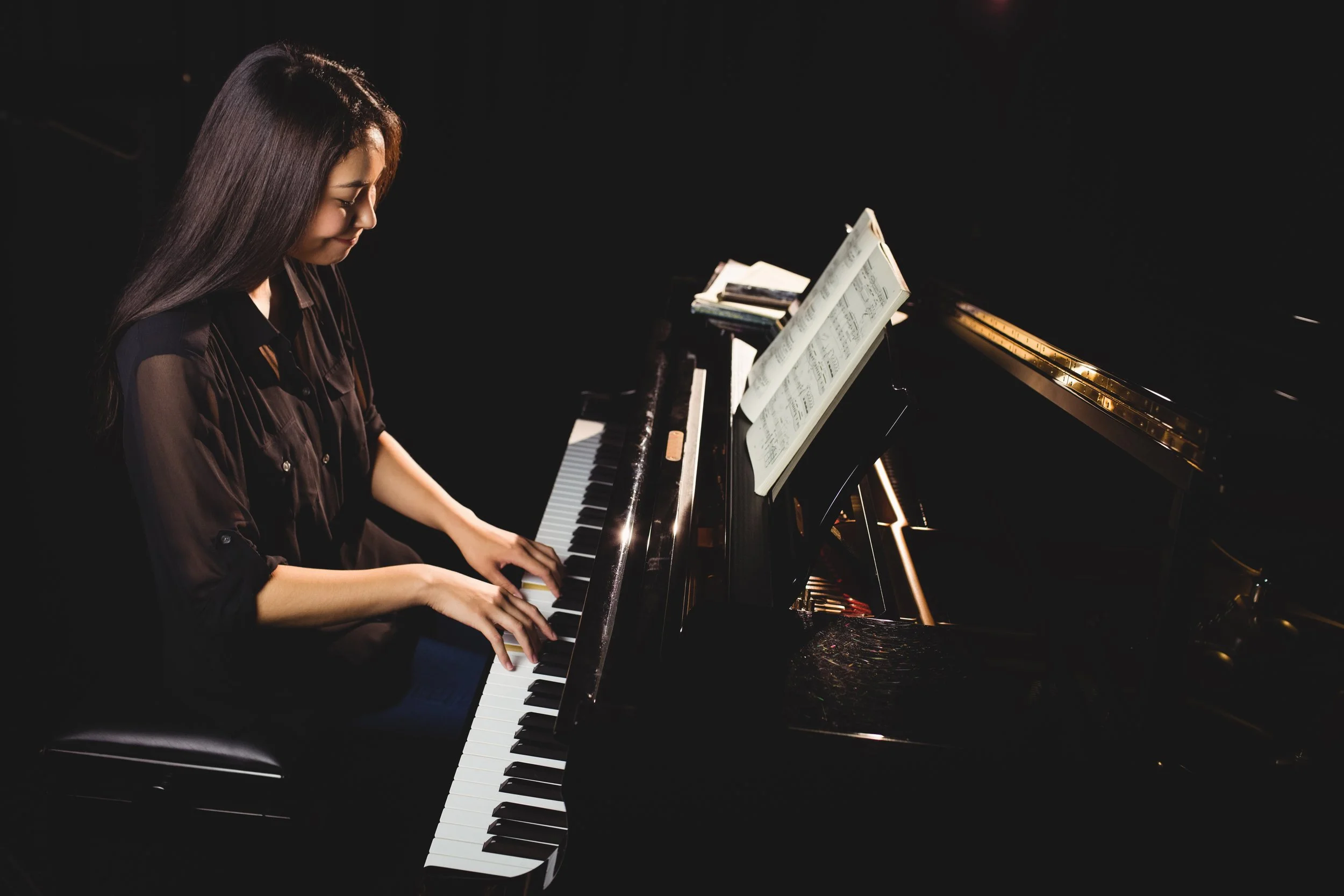
Confidence. Creativity. Can-do attitude.
It begins here.
Music Theory, Music Composition, & Songwriting
Exploring Music Theory, Music Composition, and Songwriting offers a profound and joyful journey into the heart of musical creation.
Music Theory, Music Composition, & Songwriting Music Lessons
“This class totally saved me. I went from barely understanding key signatures to scoring a 5 on the AP exam!”
— Kevin J.
"My teacher made music theory fascinating, especially when we were connecting chord progressions to my music and the video game music I like. I’m now double‑majoring in music composition at college! My teacher helped me start to learn to hear music on a whole new level."
— Caroline E.
Exploring Music Theory, Music Composition, and Songwriting offers a profound and joyful journey into the heart of musical creation.
Music Theory provides the essential framework, unlocking the mysteries behind harmony, melody, and rhythm, allowing musicians to understand and articulate the intricate language of music.
This foundational knowledge paves the way for Music Composition, where the theory transforms into the art of crafting original pieces that resonate with emotion and complexity.
Songwriting, then, becomes the personal and expressive culmination of these skills, blending poetic lyrics with musical ingenuity to tell stories and convey feelings in a universally powerful way.
Together, these disciplines not only enrich one's appreciation and mastery of music but also open a boundless avenue for creativity and emotional expression, making the study of music an endlessly rewarding endeavor.
Deep Understanding of Music
Music theory lessons give students a clear picture of how music works beneath the surface. This foundational knowledge helps them read, write, interpret, and perform music with confidence. At the Laguna Niguel School of Music, music theory lessons are designed to make these concepts accessible and engaging for all skill levels.
Boosting Academic Skills
Studying music theory strengthens skills that transfer directly to academics, including critical thinking, pattern recognition, and problem-solving. These cognitive benefits can improve performance in math, reading, and other subjects. Students often find that their focus and memory improve as they learn to analyze musical structures.
Creative Freedom Through Composition
Composition lessons empower students to create their own music, fostering imagination and personal expression. Writing original pieces allows students to explore emotions and ideas in a unique way. The supportive instructors at the Laguna Niguel School of Music encourage students to experiment and develop their individual style.
Songwriting as Storytelling
Songwriting combines music theory with lyric writing, helping students become storytellers through sound. This process builds language skills, emotional intelligence, and communication abilities. Students learn how to convey messages and connect with listeners, skills valuable both on and off the stage.
Personalized Learning for Every Student
Music lessons are tailored to each student’s goals, whether they want to pass exams, compose for fun, or prepare for advanced music studies. This individualized approach ensures students stay motivated and make steady progress. The Laguna Niguel School of Music prides itself on matching students with teachers who inspire and challenge them appropriately.
Building Confidence and Performance Skills
Understanding music theory and composition helps students perform with greater confidence, knowing the why behind the music. This deeper knowledge reduces anxiety and allows for more expressive playing or singing. Group workshops and recitals at the studio provide valuable opportunities to showcase these new skills.
A Pathway to Lifelong Musical Enjoyment
Learning music theory, composition, and songwriting opens doors to endless musical possibilities, whether in classical, pop, jazz, or other styles. Students gain tools that support all future music endeavors, making music a lifelong source of joy. The Laguna Niguel School of Music offers a nurturing environment where these passions can grow and flourish.
Exploring Music Theory, Composition, & Songwriting
Studying music theory, composition, and songwriting offers numerous benefits that enhance both musical ability and personal development. Music theory provides the foundational knowledge necessary to understand how music works, including harmony, melody, rhythm, and structure. This knowledge improves musicianship, allowing players to sight-read more effectively, improvise with confidence, and compose their own music with greater intentionality. By understanding scales, chords, and progressions, musicians can analyze and interpret music more deeply, leading to stronger performances and a greater appreciation for various styles and genres.
Composition and songwriting allow musicians to express themselves in unique and personal ways. Writing music fosters creativity and innovation, encouraging students to explore different sounds, genres, and musical textures. It also strengthens problem-solving skills, as composers must decide how to structure a piece, develop a motif, and create emotional impact. Songwriting, in particular, blends poetry and music, helping individuals communicate feelings, tell stories, and connect with listeners on an emotional level. This self-expression can be therapeutic, serving as an outlet for emotions and thoughts that might be difficult to express otherwise.
Beyond personal growth, studying these disciplines opens up exciting career and performance opportunities. A strong understanding of theory and composition benefits not only composers but also instrumentalists, vocalists, conductors, and producers. Musicians with skills in arranging and songwriting can find success in film scoring, music production, teaching, orchestration, and even the business side of the music industry. Furthermore, the discipline and creativity developed through these studies enhance critical thinking, patience, and perseverance — skills that are valuable in many professional and personal pursuits. Whether a musician aspires to perform, compose, teach, or simply deepen their love of music, studying music theory, composition, and songwriting is an enriching and rewarding journey.

“Dr. Dennis’ creativity, preparation, and attention to detail positively set the stage for learning to occur. He creates an atmosphere that motivates students to take risks and challenge themselves to advance. Dr. Dennis demonstrates the desire to see students succeed through his dedication, self-evaluation, and compassionate nature.”
— Kim R.


